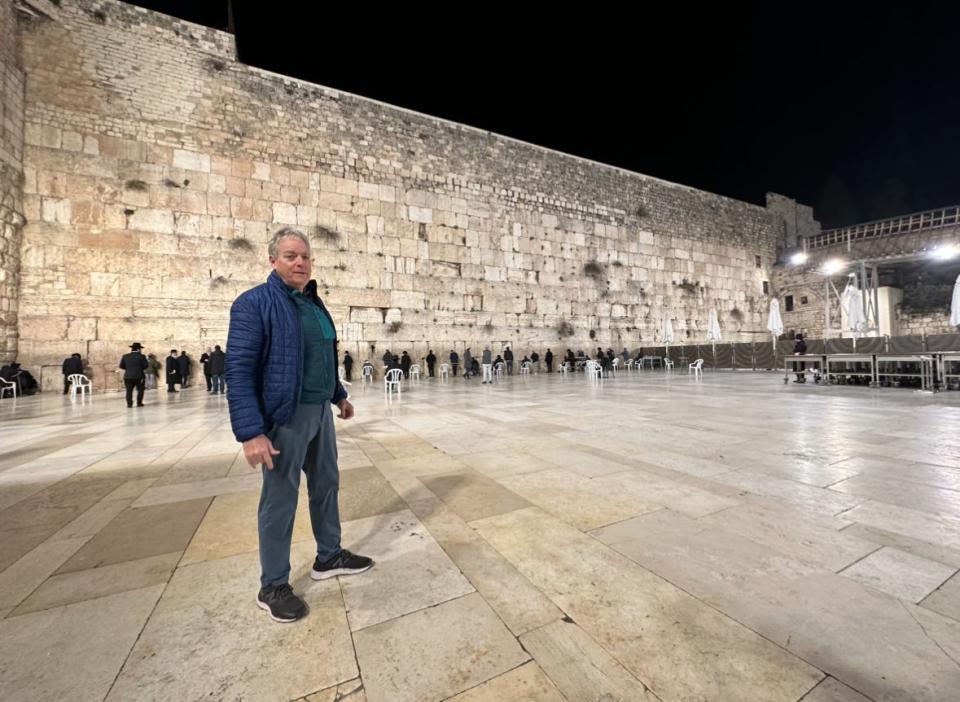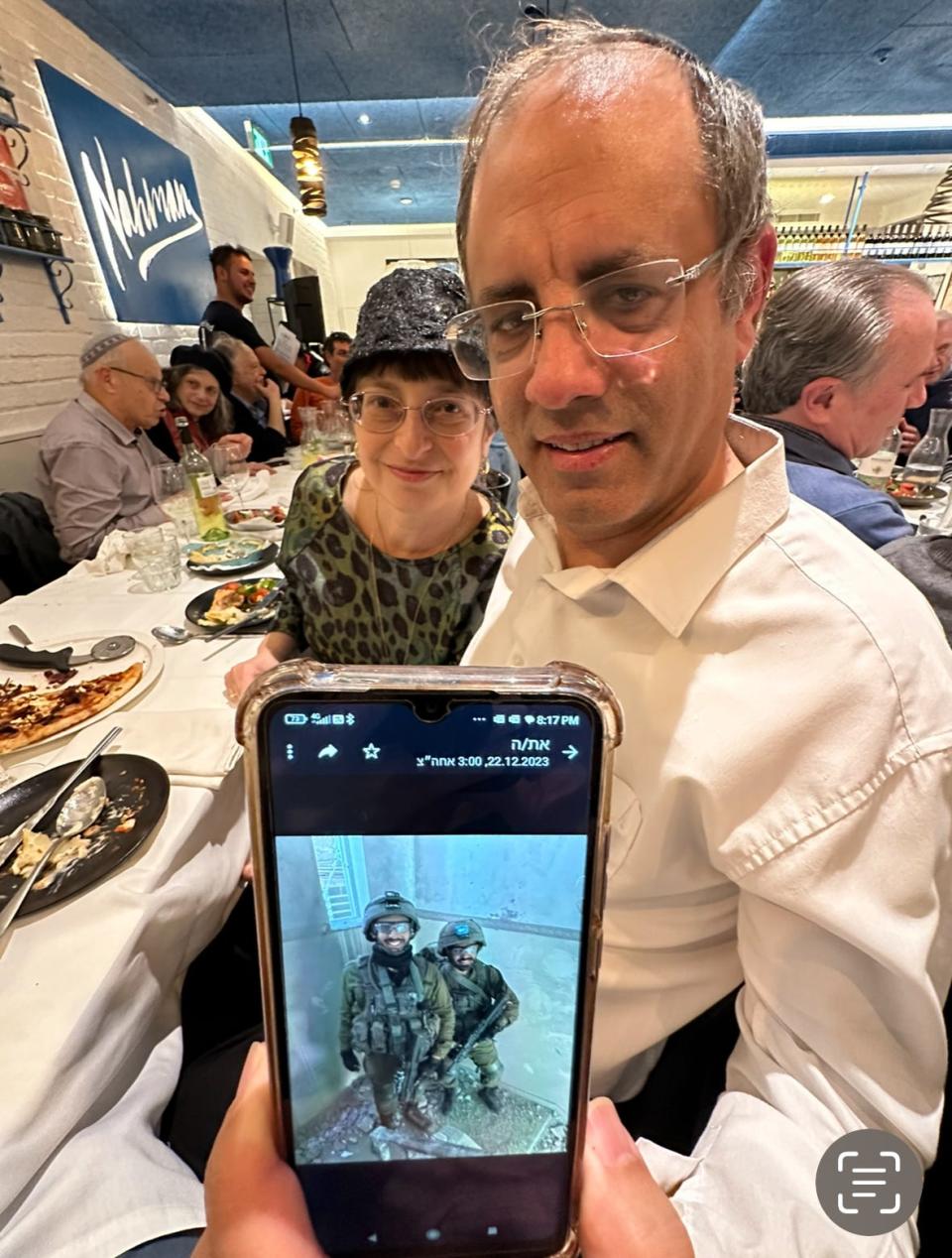Mark Patinkin in Israel: Finding contrast between normalcy and war on first day
We land in Ben Gurion Airport, day one of a trip to experience the Holy Land at war – day 100 since Oct. 7 – except all feels quite ordinary. And then you see them.
An endless row as you walk toward baggage – more than 200 kidnap posters, a thing universal here, except these are a bit different, dozens having either yellow or black slashes with Hebrew lettering.
Later I would ask.
The yellow, I was told, means brought home.
And the black?
Murdered.
Such contrast is Israel now, a resilient place, buzzing with normalcy, because that is how people here have coped for 76 years, and yet this thing that happened Oct. 7, and is happening in Gaza, is always there.
I'm accompanying a group organized by the Jewish Alliance of Greater Rhode Island for the first couple of days of this trip. As we pull away on the airport bus, we are welcomed to Israel and then told that, in the event of sirens, the good news is we’re far enough from Gaza that before the rocket hits, we’ll have 90 seconds instead of 10 to get to a shelter, and almost all buildings have one.
Then we are off to our hotel, traversing the entire nation of Israel in a single hour, from Tel Aviv to the Eternal City, and soon we are exploring it.
What a beautiful, stunning place, Jerusalem. You can almost hear the song of history in its limestone walls and ancient, winding streets.
Later this first night, we would walk to the central Old City, past the Jaffa Gate that still has bullet scars from the war of 1948. Past the Fortress of David, down the long, narrow pathway through the Christian quarter near the Church of the Holy Sepulchre, where Jesus died and rose. Finally, we emerge in sight of the majestic Western Wall itself, with scores of Orthodox Jews praying at it, and soon I am next to them.

I am not overly religious or prone to prayer, but when you touch this ancient stone, you can't help but ask God for the things you hope for in this world, and a part of you believes that just maybe, this is among the handful of places on Earth where he is most likely to hear you.
They say the conflict between Arab and Jew is among the world’s most complex, and it is, but if you look toward the top of the wall, where Solomon built his temple 3,000 years ago before the Babylonians destroyed it, you also understand the simplicity.
This most holy spot for Jews, its huge limestone blocks soaring 60 feet into the magenta Jerusalem sky, is now the retaining wall for the golden Dome of the Rock, among the holiest and most beautiful of all Islamic sites.
And now you see. For millennia, three great faiths have competed over the same few acres. And today, once again, it is part of the reason for more heartache.
Yet here at the wall, you feel only peace, until you walk across the vast concourse and on the opposite side find a new monument in this sacred place, a metal plaque bearing 1,200 names of the Oct. 7 murdered, lit candles beneath it. Usually, it takes years before a nation starts putting up memorials, but this slaughter was so horrific that no one doubts it will stand in Israeli history alongside the wars of 1948, 1967 and 1973.
The contrasts between normalcy and war have defined my first days in Israel
It is easy to forget what is happening 60 miles distant as you walk down a glitzy outdoor mall in the heart of Jerusalem, past limestone and glass, Tommy Hilfiger and Pierre Cardin, vibrancy in the air, and then I pass a tall, sandy-haired young man saying, "… when I was in Gaza ..."
So I stop and ask, and he gives his name as Adam – he’s 23, and yes, he was there for two months. And yes, he says quietly, he lost friends.
I tell him I'm an American journalist and might I ask him about it?
He pauses, then says he can't; it’s too hard.
“Everything you've seen in the media,” says Adam, “it doesn't scratch the surface of what it’s like.”
For the first 48 hours of this 10-day trip, I'm with a group of 20 from Rhode Island, and this arrival night, we gather at a typical Israeli restaurant, across from each other at a long table, the place full, and, once again, the war seems far away.
I am seated next to an Israeli friend of one of our group, a well-dressed middle-aged gentleman. I ask how he is doing.
Fine, happy to be with you – lovely night.
Then I go there, asking if Oct. 7, and the war, have changed Israel – and him.
It is almost as if a cloud has lowered.
He says he has not been himself – how could he be? – then glances at his phone and tells me he is waiting to hear if his son is OK.
His son?
Yes – he’s been fighting in Gaza for two months.
The way it works, he explains, is most soldiers aren't allowed cellphones because they could be tracked. Only the commander has one, and when he can, he texts his men’s parents to say everyone is all right.
The story of Evyatar, the young soldier in Gaza, and his father
And so, for this first story from Israel, I give you Akiva Sylvetsky, 57, a Jerusalem attorney with a son of 22 named Evyatar, who is a foot soldier in Gaza.
Evyatar was deployed two weeks after the war began. His parents didn’t see him for two months. After a few days' leave, he’s now back in it.
You picture Israeli troops in Gaza moving carefully around corners, which certainly happens, the fighting house to house. But because of the tunnels and the density of buildings, because of enemy snipers and RPGs, Evyatar spends many hours with nine fellow soldiers inside an armored troop carrier. They sleep sitting up, feet between the men across. Once, the air conditioning broke all day, and it was stifling, but too dangerous to go out. Nor is there such a thing as a shower.

There are 80 or so soldiers in the squadron, their parents on the commander’s WhatsApp notification group. Israel tends to live on WhatsApp. Usually, texted assurances arrive twice a day.
On the nights they don’t, Akiva sleeps poorly. Friends of his, he tells me, have lost sons.
“We are sitting shiva all over the place,” he said.
As we chatted, he told me he at first didn’t want to go to restaurants while his son was in a troop carrier in Gaza. He even hesitated this night.
But he pushes himself to get out and about, feeling that it honors the sacrifice of the soldiers.
“The purpose of what we're doing is so people can lead a sane and normal life,” Akiva said.
He added that others have it worse – a lawyer friend has five boys in Gaza and a sixth up north on the border with Lebanon.
He paused to check his phone. Nothing.
The last message, many hours ago, had said simply, “Good afternoon – all the soldiers are healthy” – “shlemim” in Hebrew.
Except, Akiva said, “healthy” is not an exact translation. It means more than that.
“How do you put it in English?” he mused. “Shlemim. Wholeness. In one piece, I guess you'd say.”
His son wants to be a professor, so once a week, Akiva and his wife send him economics and philosophy books. There’s a lot of time in that troop carrier.
Akiva himself was in Gaza in 1987 during the first Intifada. He remembers stopping a donkey-drawn wagon that was out past curfew and finding two kids around 8 and 12 alone under a blanket shivering at the sight of an Israeli soldier. They said they were trying to bring eggs to their grandparents.
The moment stays with him.
“No matter what I think politically,” Akiva told me, “or what the solution to Gaza should be – there are civilians there. People suffering.”
He considers them victims of both war and their own extremist leaders.
As someone at the table passed around an Israeli salad with tomatoes, cucumbers, onions and olive oil, Akiva told me he lives in Efrat, a liberal West Bank Jewish settlement known for good relations with Palestinian neighbors, established 40 years ago near Jerusalem and now with 10,000 people.
He moved there more for economics than politics – when he bought in Efrat, he was able to own a nice house for the price of a small Jerusalem condo.
“So you're not running around like a crazy extremist with guns,” I asked.
“I don't even have a gun,” said Akiva.
At that, his wife, Noa, a doctor, came over to join us.
I asked them if Efrat had lost many in Gaza.
Noa nodded. Unfortunately, she said, their cemetery has grown.
How do they feel about the angry global reaction to what Israel is doing in the war?
Friends who just traveled to Europe, said Akiva, told him they were shocked by the antisemitism. They didn’t realize the hatred for Israel was so deep.
More Patinkin: I've seen the faces of Gazan Palestinians. They haven't been forgotten
Akiva told me it’s not the first time in history that Jews have been despised.
But unlike previous centuries, he said, they at last have a refuge and the ability to defend themselves.
“If we did what the world wants us to do,” said Akiva, “we're going to lose. If we don’t save ourselves, we won’t exist.”
Suddenly, his phone buzzed.
Their son’s commander.
Everyone, he texted, was shlemim.
Soon, we were walking back to the hotel.
The streets along the way were busy and upbeat.
As is much of Jerusalem in this time when, despite a veneer of normalcy, the war is always there.
Mark Patinkin is traveling to Israel personally and is not sponsored by or affiliated with any organization. He will report firsthand from the region as he has done for the last four decades through his award-winning journalism. He can be reached at mpatinki@providencejournal.com.
This article originally appeared on The Providence Journal: On journey in Israel Mark Patinkin finds contrast between normalcy, war

